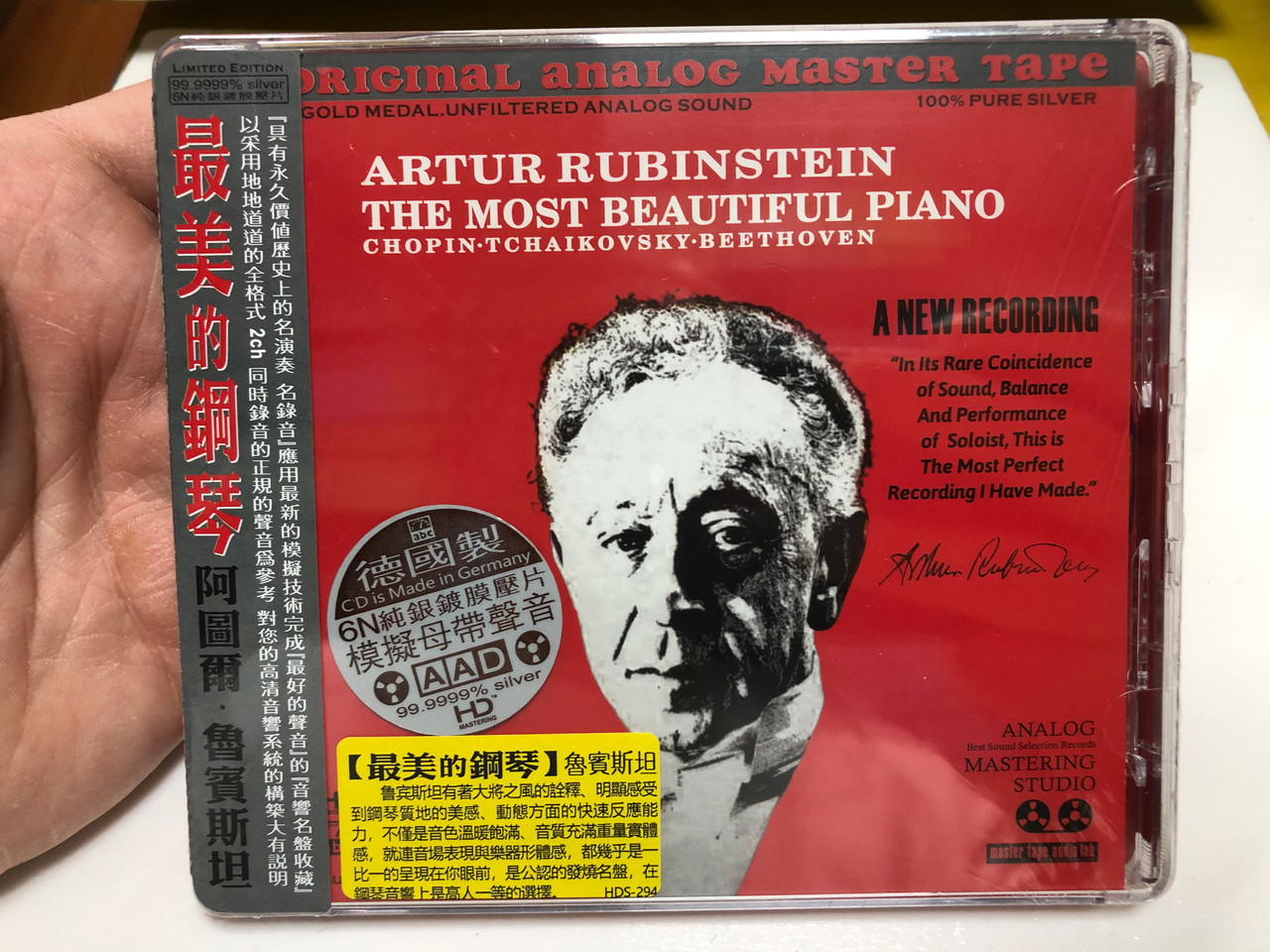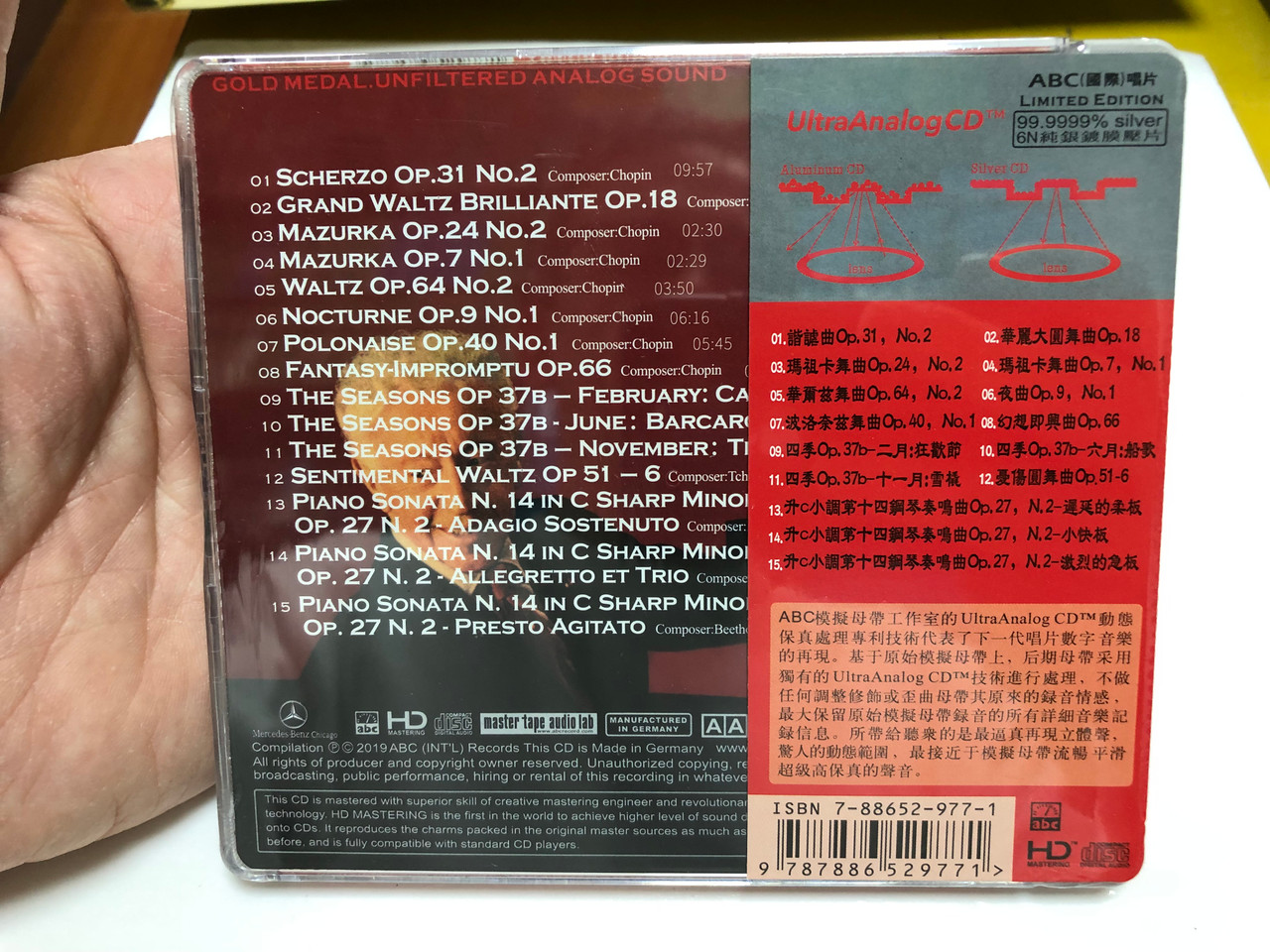Description
Artur Rubinstein - The Most Beautiful Piano / 最美的鋼阿圖爾·魯賓斯坦 / CHOPIN TCHAIKOVSKY - BEETHOVEN / Ultra Analog CD AAD
UPC 9787886529771
Product Details:
- Format: Ultra Analog CD
- Edition: Limited Edition (99.9999% pure silver disc)
- Audio Source: Original Analog Master Tape
- Recording Label: ABC (Intl) Records
- Release Year: 2019
- Made in: Germany
Overview:
Celebrate the timeless artistry of Artur Rubinstein with this meticulously crafted Ultra Analog CD, presenting his most iconic piano performances. Rubinstein’s interpretations are celebrated for their commanding presence, rapid dynamic response, and warm, resonant tones. This release uses 6N pure silver-plated discs to ensure unparalleled audio clarity, embodying the elegance of classical piano music at its finest.
Enhanced by the latest HD Mastering technology, the recording faithfully reproduces the charm of the original master tapes, preserving every nuance of Rubinstein’s artistry. Designed for audiophiles, this limited edition delivers the most lifelike stereo sound, providing a near-analog experience.
Track Listing:
- Scherzo in B-flat Minor, Op. 31, No. 2 – Frédéric Chopin (9:57)
- Grand Valse Brillante, Op. 18 – Frédéric Chopin
- Mazurka in C Major, Op. 24, No. 2 – Frédéric Chopin (2:30)
- Mazurka in B-flat Major, Op. 7, No. 1 – Frédéric Chopin (2:29)
- Waltz in C-sharp Minor, Op. 64, No. 2 – Frédéric Chopin (3:50)
- Nocturne in B-flat Minor, Op. 9, No. 1 – Frédéric Chopin (6:16)
- Polonaise in A Major, Op. 40, No. 1 – Frédéric Chopin (5:45)
- Fantaisie-Impromptu in C-sharp Minor, Op. 66 – Frédéric Chopin
- The Seasons, Op. 37b – February: Carnival – Pyotr Tchaikovsky
- The Seasons, Op. 37b – June: Barcarolle – Pyotr Tchaikovsky
- The Seasons, Op. 37b – November: Troika – Pyotr Tchaikovsky
- Sentimental Waltz, Op. 51, No. 6 – Pyotr Tchaikovsky
- Piano Sonata No. 14, Op. 27, No. 2 - Adagio sostenuto – Ludwig van Beethoven
- Piano Sonata No. 14, Op. 27, No. 2 - Allegretto e Trio – Ludwig van Beethoven
- Piano Sonata No. 14, Op. 27, No. 2 - Presto agitato – Ludwig van Beethoven
Key Credits:
- Pianist: Artur Rubinstein
- Composers: Frédéric Chopin, Pyotr Tchaikovsky, Ludwig van Beethoven
在20世纪的钢琴艺术史上,有一位大师的光芒异常璀璨:为了表彰他对表演艺术的杰出贡献,美国政府曾授予他自由勋章;英国王室曾授予他二级骑士勋位;荷兰皇室曾赐予他荷兰拿索骑士团荣誉,并将一种新培植的郁金香以其名命名;1971 年,他荣获丹麦年度音乐奖与法国雷吉昂·德·努彭勋章;1972年,他又获得法国艺术院院士头衔…这位集诸多光环于一身的钢琴大师便是:美国《时代》周刊在评选20世纪最为杰出的四大钢琴演奏家时名列榜首的现代钢琴泰斗、美籍波兰钢琴家阿图尔·鲁宾斯坦(Artur Rubinstein,1887—1982年)。
鲁宾斯坦有着卓异的音乐禀赋及一双超出常人的大手,正是因为拥有了这双在键盘上张开即可以达到12度的天赐之手,才使他得以随心所欲地施展其令人叹为观止的演奏技巧。鲁宾斯坦具有极强的读谱能力及超常的记忆力,据说他能将上百首作品的乐谱存储在脑海里。无论是哪一位作曲家的作品,只要稍加视读,便能够登台演奏;即便是那些陌生冷僻的作品,他也只需在赶赴下一场音乐会的途中,将乐谱稍读几遍,便能轻而易举地在演奏会中呈现出来。他说:“我弹琴时谱子在脑子里一页一页地翻过去,我甚至看得见谱子上咖啡的污迹。”其惊人的才华和充沛的精力常使人大为震惊,且不得不为之叹服。
鲁宾斯坦是一位非常全面的钢琴家。他对不同时代、不同国家作曲家的作品都有着深刻的研究,并能将其同样演奏得精彩绝伦。他的演奏粗犷而细腻,他的音色明亮而华丽,他对乐曲的诠释总是带着高贵的气质与特有的浪漫。
鲁宾斯坦对肖邦的音乐具有权威性的理解,他所演奏的肖邦可谓是空前绝后的珍品,其指尖流淌出的是波兰人所特有的力量与热情。有人说鲁宾斯坦在演绎肖邦作品时,与其说是他在演绎肖邦,还不如说他是在借肖邦的音符表达自己对故乡的眷恋。从这一点上看,鲁宾斯坦的演绎确实要比别人多了一份坦然。著名指挥家、钢琴家巴伦博伊姆曾在一次采访中这样评价鲁宾斯坦的演出:“是鲁宾斯坦让我了解了肖邦。他开场常弹的一首曲子是肖邦的《f小调幻想曲》,他高贵、宏大的演奏风格与当时流行的像患了结核病似的病态、感伤的肖邦演奏风格形成了鲜明的对比。鲁宾斯坦的处理非常有阳刚之气,他弹出了音乐的高贵与宏大,我找不出更好的词来形容。”
鲁宾斯坦是肖邦音乐演奏史上一位里程碑式的人物。其缠绵婉转的美妙琴声,更能将人带到“钢琴诗人”那充满诗情的田园意境中去。在他之前,人们眼中的肖邦仿佛只是个柔情缠绵、脆弱、顾影自怜的沙龙钢琴家形象,但在鲁宾斯坦的手指下,所勾画出的却是这位浪漫派钢琴大师充满朝气、生机盎然的真实魂魄。在他演奏的肖邦的全部《夜曲》中,那如梦如幻的诗情画意,就像是从浩渺的天际飘逸而出,音响润泽浓密,意境悠长深远,既有与“夜”的幽静相一致的静谧和温馨,又有节奏多变、富有弹性和张力的生命跃动,加之自然流露出的某种即兴和幻想风格的自由挥洒,把肖邦对夜的种种移情和心灵投射描绘得淋漓酣畅,通达无碍,听起来韵味十足,迷人至极。此外,肖邦的波罗涅兹、玛祖卡、谐谑曲、即兴曲等也被鲁宾斯坦演绎得墙外开花别样红,使他的名字几乎与肖邦成了同义词。
虽然被称为“最正宗的肖邦”,但鲁宾斯坦的演奏范围却并非仅限于此,其曲目的选择异常广泛,且都因其极富创造性的演绎而独具一格。尤其他所诠释的贝多芬,更能将之与他超逸的诗意、鲜活的灵感与生命力、浩瀚无边的想象力完美地合二为一。晚年的鲁宾斯坦,在其高超的技巧中,更多透射出的是人性的光芒,琴音真挚,温暖人心。当音符从他的指尖如流水般奔泻而出时,我们所感受到的是鲁宾斯坦那高贵的气度,那气宇轩昂的浪漫情怀中所蕴含的贵族气息与英雄气势,绝非一般品位的演奏家所能企及。
In the history of the piano in the 20th century, there is one master who has shone exceptionally brightly: in recognition of his outstanding contribution to the performing arts, the United States government awarded him the Medal of Freedom; the British Crown conferred on him a second degree of knighthood; the Dutch Crown honored him with the Knights of the Order of the Netherlands of Nassau, naming a newly planted tulip in his honor; in 1971 he was honored with the Danish Music Prize of the Year and the Order of Régislé de Noupen; and in 1972 he was awarded the title of Academician of the French Academy of Arts…. In 1971, he was awarded the Danish Music Prize of the Year and the French Order of Région de Nupont; in 1972, he was made a member of the French Academy of Fine Arts… This master pianist, with all his aura of glory, is the Polish-American Artur Rubinstein (1887-1982), one of the great masters of the modern piano who tops the list of the four most outstanding pianists of the twentieth century, as chosen by the American weekly magazine "Time". Artur Rubinstein (1887-1982).
Rubinstein has a remarkable musical endowment and a pair of big hands beyond the ordinary people, it is because of this pair of hands on the keyboard can reach 12 degrees of the natural gift, so that he was able to exert his breathtaking virtuosity at will. Rubinstein had a great ability to read music and an extraordinary memory, and it is said that he could store the scores of hundreds of pieces in his mind. No matter what composer he was playing, he could perform it on stage with a little sight-reading; and even if it was an unfamiliar and out-of-the-way work, he could easily present it in a recital by reading the score a few times on his way to the next concert. He says, "The score goes page by page in my head as I play, and I can even see the coffee stains on the score." His prodigious talent and abundance of energy often astounded and had to be marveled at.
Rubinstein was a very versatile pianist. He was a deep student of the works of composers from different eras and countries and was able to play them with equal splendor. His playing was rough and delicate, his tone bright and magnificent, and his interpretations of the music were always characterized by a noble temperament and a characteristic romance.
Rubinstein's understanding of Chopin's music is authoritative, and his performances of Chopin are unprecedented treasures, with the power and passion of the Polish people flowing from his fingertips. It has been said that when Rubinstein was interpreting Chopin's works, rather than interpreting Chopin, he was using Chopin's notes to express his attachment to his homeland. From this point of view, Rubinstein's interpretation is indeed more than others a candid. The famous conductor and pianist Barenboim once commented on Rubinstein's performance in an interview: "It was Rubinstein who made me understand Chopin. One of the pieces he often played at the beginning of the program was Chopin's Fantasy in F Minor, and his noble, grandiose style of playing contrasted sharply with the morbid, sentimental Chopin style that was popular at the time, which was like suffering from tuberculosis. Rubinstein's treatment was very masculine, and he played the music with a nobility and grandeur that I can't find a better word for."
Rubinstein is a landmark figure in the history of Chopin's musical performance. His melodious and beautiful piano sound is more than capable of bringing people to the "piano poet" in a poetic idyll. Before him, people's eyes Chopin seems to be only a tender, fragile, self-pitying image of the salon pianist, but in Rubinstein's fingers, outlined by the Romantic master of the piano is full of vitality, full of vitality of the real soul. In his performance of Chopin's "Nocturne", the dreamlike poetry, as if floating from the vast sky, sound moist and dense, long and far-reaching mood, both with the "night" of the quiet consistent with the quiet and warm, but also the rhythm of the rhythm of the change, elasticity and tension of the life of the leap, coupled with the natural flow of a certain improvisation and fantasy style of free play, the piano is full of vigor. In addition, there is a kind of improvisation and fantasy style of free play, which depicts Chopin's empathy and spiritual projection of the night in the most unrestrained and unobstructed way, sounding full of flavor and fascinating to the extreme. In addition, Chopin's Polonaises, Mazurkas, Harmonies, and Impromptus have also been interpreted by Rubinstein in such a way that his name has become almost synonymous with Chopin.
Although he is known as "the most authentic Chopin", Rubinstein's repertoire is not limited to this, his choice of repertoire is very wide, and all of them are unique due to his very creative interpretation. His interpretation of Beethoven, in particular, is a perfect synthesis of his transcendental poetry, his vivid inspiration and vitality, and his boundless imagination. In his later years, Rubinstein's virtuoso technique was characterized by the light of humanity and the sincerity and warmth of his voice. When the notes from his fingertips like water cascading out, what we feel is Rubinstein's noble temperament, that lofty romantic feelings contained in the aristocratic atmosphere and heroic momentum, by no means the general taste of the performers can reach.















